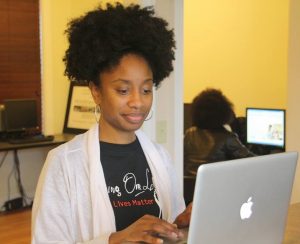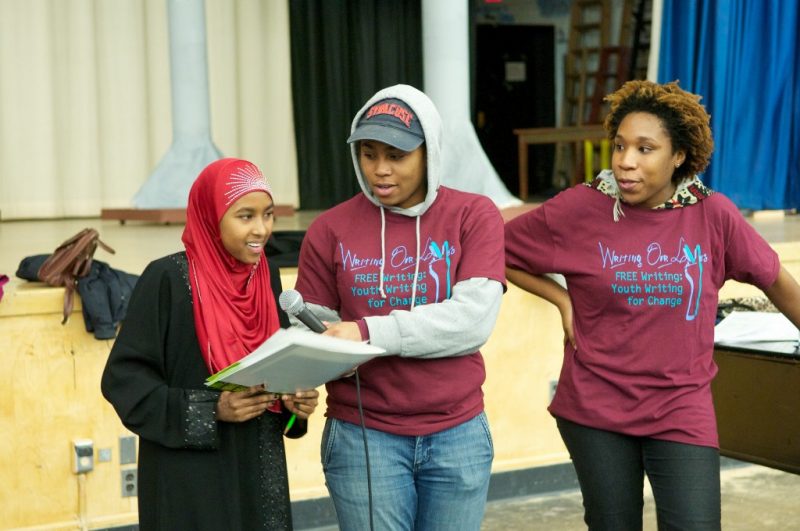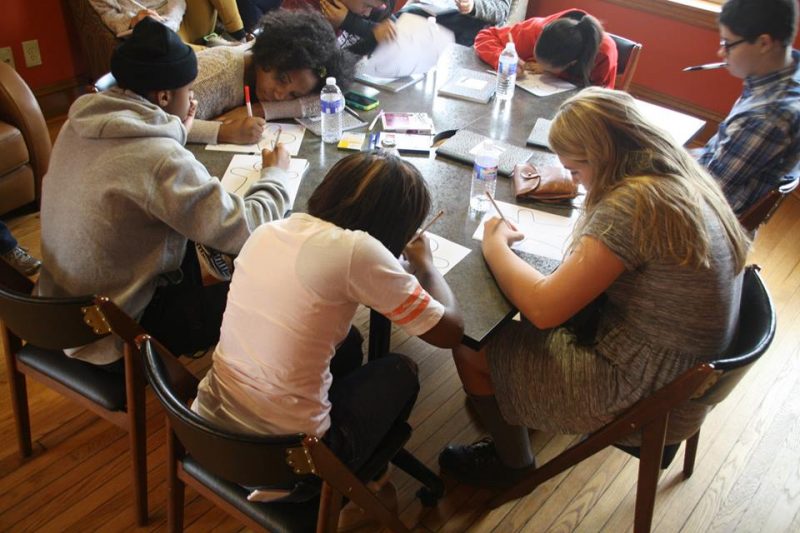For the past six years, the Writing Our Lives conference has been helping young area writers share their stories and listen to the stories of other young people. But the event also brings about a wider impact. The conference—being held Nov. 7—is continuing to strengthen and build a vibrant local community of writers. That was always part of the goal for Marcelle Haddix, the conference founder.
“The Writing Our Lives conference provides a space for Syracuse youth writers to share their stories and to share their writing practices with one another,” says Haddix, Dean’s Associate Professor and chair of Reading and Language Arts in the School of Education. “And it’s an opportunity to engage with community writers, poets, artists and educators who bring their talents and gifts to the conference to share with today’s youths.”
 The learning between the young writers and mentors is reciprocal.
The learning between the young writers and mentors is reciprocal.
“We are trying to foster and create a community of writers that is inclusive of adults and youth across backgrounds, race, class, gender, sexuality and religion,” Haddix says. “It really is to create a space for all of us who love to write and who have stories to share. It’s a way to tell those stories and learn how to listen, receive and bear witness to others’ stories.”
This year’s conference will be held at Danforth Middle School on Saturday, Nov. 7, from 9 a.m.-2 p.m. The event is open to middle and high school students, grades 6-12. Pre-registration is recommended, but those interested can sign up that day. The conference is an opportunity for young people to give voice to the relevant issues in their lives and each year has a different theme.
“This year’s focus is #BeFree. It is about freedom in terms of freedom of expression and being an individual,” Haddix says. “But it’s also about connecting to broader political themes around liberation, and feeling free in your school environment, in your community, and not constantly being under surveillance or being controlled.”
Since the conference first started in 2009, Syracuse University graduate students have also taken part in the conference.
“Another great thing about Writing Our Lives is that I’m able to mentor and support a lot of graduate students who want to do this kind of community engaged work and will be facilitating workshops,” Haddix says. Genres for the conference and its workshops include songwriting, fiction, journaling, comics and illustration, poetry and digital literacy.

Along with Syracuse University students and faculty members, local artists, such as members of the Underground Poets, who do spoken word poetry, and community poet Georgia Popoff will be doing a workshop. Popoff is a faculty member and workshops coordinator of the Downtown Writer’s Center, the Syracuse chapter of the YMCA Writers Voice. Her work includes a Saturday workshop with young people, many of whom will also be participating.
The conference draws between 100-150 students every year from the City of Syracuse and surrounding communities, as well as from places further away such as Utica and Skaneateles.
“Young people can engage with other youth who they might not usually have the opportunity to engage because of where they live,” Haddix says. “They get to see both their similarities and their differences in terms of their experiences.”
Since the conference began, Haddix has developed further programs: an afterschool program at Danforth Middle School and a summer institute at the South Side Communication Center, where students continue to explore their writing and substantive subject matter. They have focused on raising awareness about issues in their communities, such as food justice, teen pregnancy, community violence and educational equality. Plans are also in the works for Writing Our Lives in New York City at the University’s Fisher Center.
Working with all of the writers at the conference and at the other programs has been an inspiration to Haddix, who has discovered her own aspiration to write young adult literature.
“I’m an academic and do scholarly writing, but I do want to write more creatively and to create characters and share stories that appeal to a younger audience,” Haddix says. “Writing Our Lives has such a positive, contagious energy. I love being in that space.”

